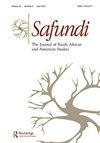Yearning for rootedness in a femicidal landscape
IF 0.2
Q4 AREA STUDIES
Safundi-The Journal of South African and American Studies
Pub Date : 2020-09-29
DOI:10.1080/17533171.2020.1823740
引用次数: 2
Abstract
A lot has changed since I first watched Zulu Love Letter in 2005, and much has remained the same about the traumas of post-1994 South Africa, which preoccupy the film. This piece comments on two issues – the lingering violence of apartheid trauma and state neglect of the disabled – by examining the film alongside two sets subsequent incidents: the publication of lead actress Pamela Nomvete’s memoir Dancing to the Beat of the Drum: In Search of my Spiritual Home (2012) and various high-profile incidents which underlined fatal state neglect of disabled South Africans. These two sets of incidents resonate with the film’s commentary on state violence and its production of unbelonging. If, as Bhekizizwe Peterson writes, “Zulu Love Letter is about two mothers in search of their daughters,” both literally and symbolically lost to apartheid brutality, then one of these mothers – Thandeka in the film – was also in search of herself in the actor Pamela Nomvete’s real life – owing to apartheid displacement. When I first watched the film, I was stunned by Nomvete’s powerful interpretation of the character Thandeka as an invincible, deeply wounded and angry journalist, mother, and activist. Born in Ethiopia in March 1963, Nomvete grew up in exile, in Ethiopia, Lusaka, and London among other places, before returning to South Africa in 1994. She had been an up-and-coming theater actress in London, and soon landed the role of Nstiki Lukhele on the premier South African soap opera, Generations, which catapulted her to celebrity as a household name. The fame and money drew one Collins Marimbe into her life. They married in 2002, but by 2007, Nomvete was bankrupt, homeless, and seeking divorce from the abusive Marimbe. There are uncanny parallels between Thandeka’s trauma and Nomvete’s breakdown in real life. In Zulu Love Letter, Thandeka wrestles with alienation: her relationships with her child, her parents, her child’s father, and her colleagues are all under terrible strain from her anger and survivor’s guilt about the murder of Mike, her child’s deafness, and unprocessed trauma of witnessed horrors. Nomvete’s memoir Dancing to the Beat of the Drum reveals that while she dazzled onscreen as Thandeka, offscreen, her life was spiraling out of control. After delivering an award-winning performance as Thandeka, at the end of the workday, Nomvete was going home to an emotionally and financially abusive marriage. The opening scene of the film featuring Thandeka passed out in her car was to be prophetic: a few short years later, the actress was destitute, living in her car. If Thandeka’s role in the film is as a witness – both literally, having witnessed Dineo’s murder, and symbolically, as a journalist and a witness to Me’Tau and Bouda’D’s grief – then I suggest that her offscreen life and subsequent memoir bears witness to the institutional corrosiveness of patriarchy and South渴望在女性灭绝的环境中扎根
自从2005年我第一次看《祖鲁情书》以来,发生了很多变化,1994年后南非的创伤在很大程度上保持不变,这是这部电影的重点。这篇文章评论了两个问题——种族隔离的暴力创伤和国家对残疾人的忽视——通过考察这部电影以及随后发生的两件事:女主角帕梅拉·诺维特的回忆录《随着鼓点起舞:寻找我的精神家园》(2012)的出版,以及各种引人注目的事件,突显了国家对南非残疾人的致命忽视。这两组事件与电影对国家暴力的评论及其产生的无归属感产生了共鸣。正如Bhekizizwe Peterson所写,“祖鲁情书是关于两位母亲寻找她们的女儿”,她们都在种族隔离的残暴中失去了字面意义和象征意义,那么其中一位母亲——电影中的Thandeka——也在演员Pamela Nomvete的现实生活中寻找自己——由于种族隔离的流离失所。当我第一次看这部电影时,我被诺维特对桑德卡这个角色的有力诠释惊呆了,她是一个不可战胜的、深受伤害的、愤怒的记者、母亲和活动家。诺维特1963年3月出生于埃塞俄比亚,在埃塞俄比亚、卢萨卡和伦敦等地流亡长大,1994年回到南非。她曾是伦敦一名崭露头角的戏剧演员,很快就在南非最热门的肥皂剧《世代》(Generations)中饰演恩斯蒂基·卢克勒(Nstiki Lukhele),这部剧让她成为家喻户晓的名人。名利吸引了一个叫柯林斯·马林布的人进入她的生活。他们于2002年结婚,但到2007年,诺维特破产,无家可归,并试图与虐待她的马里姆贝离婚。桑德卡的创伤与诺维特在现实生活中的崩溃有着不可思议的相似之处。在《祖鲁情书》中,桑德卡与疏离感作斗争:她与孩子、父母、孩子的父亲和同事的关系都处于可怕的压力之下,因为她对迈克被杀的愤怒和幸存者的内疚,她的孩子耳聋,以及目睹恐怖的未处理的创伤。诺维特的回忆录《随着鼓点起舞》透露,虽然她在银幕上饰演的桑德卡令人眼花缭乱,但在银幕下,她的生活正在失控。在完成了一次获奖的Thandeka表演后,在一天的工作结束后,诺维特回到了一个情感上和经济上都受到虐待的婚姻中。这部电影的开场是坦迪卡在车里昏倒的场景,这是一个预言:短短几年后,这位女演员一贫如洗,住在她的车里。如果坦德卡在电影中的角色是一个证人——字面上,她目睹了迪奥的谋杀;象征性地,她是一个记者,见证了梅塔和布达的悲伤——那么我认为她的银幕外生活和随后的回忆录见证了父权制和南方的制度侵蚀
本文章由计算机程序翻译,如有差异,请以英文原文为准。
求助全文
约1分钟内获得全文
求助全文
来源期刊
CiteScore
1.00
自引率
0.00%
发文量
0

 求助内容:
求助内容: 应助结果提醒方式:
应助结果提醒方式:


